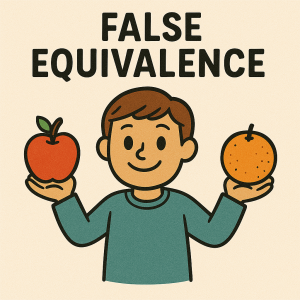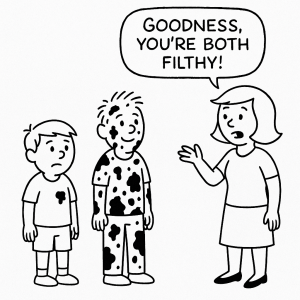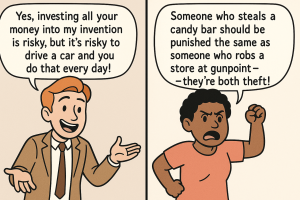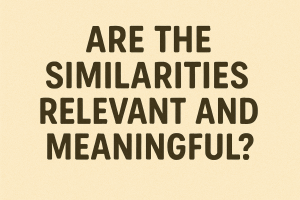False Equivalences
Kainan Jarrette and Diana Daly
What is a false equivalence?

A false equivalence is when someone is inaccurately equating two things as being equal.
You can also think of this in terms of one of our most popular English colloquialisms:
“It’s like comparing apples and oranges!”
Examples


How to Spot a false equivalence
Someone making a false equivalence will tend to focus on any similarities between the things being compared. For instance, someone might argue “apples and oranges are both fruit!” But if we’re debating which one has more vitamin c, that similarity doesn’t really matter.
What’s important is to look at the comparison and ask:

- By relevant, we mean that the similarity should relate to the topic being discussed.
- Example: if the topic is nutrition, it’s not relevant that a twinkie and a banana are both yellow
- By meaningful, we mean that the two things being compared should share the trait to a similar degree.
- Example: a twinkie and a banana both technically provide nutrition, but they don’t provide nearly the same degree of nutrition
Factual Relativism
One of the most harmful false equivalences is factual relativism — the assertion that all ideas are inherently equal and valid, regardless of their content or the evidence to support them.
Take the following two arguments:
- Argument 1 – “I believe narwhals exist. I’ve taken photos of them, I have other people who can confirm they’ve also seen them, and in fact we have one in captivity that anyone can come look at.”
- Argument 2 – “I believe unicorns exist. But I haven’t personally seen one, and there’s nowhere I can point you to go see one for yourself.”
Do these two arguments feel equal to you? Most of us would say the first argument is stronger and more valid precisely because it offers evidence to support the claim.
So what’s the harm in this? Well, imagine you had a panel meant to discuss animal life on the planet and you invited a biologist, a zoologist, an environmental scientist, and someone who believed unicorns were real. Audience members watching the panel might assume that the idea of unicorns being real has more validity than it does, simply because it was given an “equal platform” with the ideas of the other panel members.
Why False Equivalences Matter
One of the biggest problems with false equivalences is that, especially over time, they tend to flatten the world into an inaccurate “sameness.”
Firstly, this makes it much more difficult to make good, informed decisions. If someone has convinced you twinkies and bananas are basically the same, your dietary health will probably suffer.
Secondly, it can also breed cynicism — the belief that people’s motives are always selfish, dishonest, or corrupt, and that nothing is really trustworthy or worth believing. Let’s say you’ve been having a specific issue with your current cell-phone carrier, and you ask a friend if their cell-phone carrier has the same issue. Your friend responds “eh, they’re all the same, they all suck.” Not only is this not helpful, it can make you feel quite hopeless.
Lastly, it can platform and normalize extremism, especially through the factual relativism mentioned above. Rather than just being an “unpopular opinion,” extremism is a rigid and inflexible commitment to an idea, characterized by a complete unwillingness to even engage with evidence. It’s essentially like a child holding their hands to their ears and shouting “na na na, I’m not listening, I’m not listening!”
Perhaps most importantly, though, extremism can often lead to justification of violence and dehumanization — things a healthy society tries to avoid.
Look Who’s Talking!
 Everyone can make a false equivalence from time to time, especially as an honest misunderstanding. But if you see a speaker who frequently equates two things as being equal when they’re not, they’re likely doing so as an intentional rhetorical strategy, meant to manipulate the audience. This should raise serious red flags, as it undermines their credibility as an accurate source of information.
Everyone can make a false equivalence from time to time, especially as an honest misunderstanding. But if you see a speaker who frequently equates two things as being equal when they’re not, they’re likely doing so as an intentional rhetorical strategy, meant to manipulate the audience. This should raise serious red flags, as it undermines their credibility as an accurate source of information.
Knowledge Check: False Equivalences
Vocabulary
cynicism
the belief that people’s motives are always selfish, dishonest, or corrupt, and that nothing is really trustworthy or worth believing
extremism
a rigid and inflexible commitment to an idea, characterized by a complete unwillingness to even engage with evidence
factual relativism
the assertion that all ideas are inherently equal and valid, regardless of their content or the evidence to support them
false equivalence
when someone is inaccurately equating two things as being equal
rhetorical strategy
any deliberate technique a speaker or writer uses to persuade, influence, or shape how an audience thinks or feels about an issue.
Media Attributions
- False Equivalence Title © ChatGPT is licensed under a CC0 (Creative Commons Zero) license
- False Equivalence Comic 01 © ChatGPT is licensed under a CC0 (Creative Commons Zero) license
- False Equivalence Comic 02 © ChatGPT is licensed under a CC0 (Creative Commons Zero) license
- False Equivalence Text 01 © ChatGPT is licensed under a CC0 (Creative Commons Zero) license
- False Equivalence Fire © ChatGPT is licensed under a CC0 (Creative Commons Zero) license
a logical fallacy where someone is inaccurately equating two things as being equal
the assertion that all ideas are inherently equal and valid, regardless of their content or the evidence to support them
the belief that people’s motives are always selfish, dishonest, or corrupt, and that nothing is really trustworthy or worth believing
a rigid and inflexible commitment to an idea, characterized by a complete unwillingness to even engage with evidence
any deliberate technique a speaker or writer uses to persuade, influence, or shape how an audience thinks or feels about an issue

